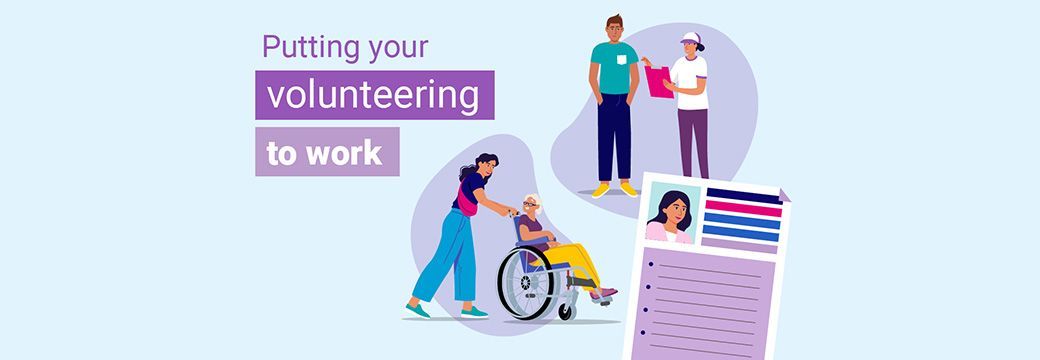How to use volunteering to boost your resume and interview success

Getting out and developing your volunteering skills is a great step in your personal and professional development. Now it’s time to bring those skills into the workplace and leverage them to help get the job you want.
Using your knowledge and skills is all about how you frame your volunteer experience. Presenting them in a clear and easy-to-understand way can help hiring managers see the value of your volunteering experience. This is particularly important, as not all workplaces and hiring managers are familiar with seeing volunteering experience on a resume.
To make the most of your volunteer experience, it’s important to talk about the value and relevance of your volunteering, while addressing the job description and application criteria. You can do this by addressing it in writing - on your resume and cover letter – and also during the interview process.
SEEK Volunteer’s ‘Putting volunteering to work’ research showed that hiring managers are drawn to volunteering experience that clearly communicates relevant and transferable skills. 45% of hiring managers deem skilled volunteering – where you put your skills to work – to be the most valuable. For example, developing a new invoicing process at a not-for-profit organisation.
Here’s some practical advice that can help candidates to frame and explain their volunteer experience to a hiring manager, to help prepare for success in the interview and hiring stages.
“I really want to hear about their volunteering experience that is relevant to the job they are applying for. This can be working in a team. If I can’t see how it will help them in the job, it isn’t as impactful.” – Hiring Manager
The dos and don’ts of resumes and cover letters
The way that you structure and explain volunteering to a hiring manager offers a unique opportunity to ensure your experience is considered in the hiring process.
One of the key findings in our report is that your volunteer experience should be short, informative and relevant when presented on paper, for example, in a cover letter. You can elaborate on it during the interview, but make sure that the experience is relevant to the role. Bear in mind that different hiring managers might have different values on certain types of volunteering. For example, those in corporate and business-related fields value formal volunteering, which operates in a clear structure, with defined goals.
Writing your resume
DO… add volunteering experience to your resume, if it is in a relevant industry or involves transferable skills.
DON’T… include too much detail regarding your volunteering experience, as it can come across as a lack of experience.
Writing your cover letter
DO… reference your volunteer experience in the cover letter - keeping it succinct.
DON’T… simply ‘name drop’ organisations you have volunteered with, unless it’s highly relevant to the role.
Key points:
- You can reference your volunteer work in your resume and cover letter, and speak to it during your interview.
- On paper, your experience should be communicated clearly and concisely.
- You can elaborate on volunteering during the interview phase, making sure it’s relevant to the role.
Answering questions in an interview
It’s great to know how your volunteer experience should sound on paper or in person, but what exactly should you talk about?
Our ‘Putting volunteering to work’ research found some valuable insights regarding what hiring managers want to know. It came down to three key points that you can reference in a clear and easy-to-understand way.
- What did you get out of your volunteer experience? This can range from soft skills to technical skill development, but bear in mind that hiring managers are looking for applicants who can talk about their transferable skills ¬– the ones that can be used for the job at hand.
- What motivated you to volunteer? Communicating the reasons behind your volunteer experience helps hiring managers understand more about who you are as a person, including your passions, attitude and drive.
- How long did you volunteer for? This is your opportunity to show off your commitment to a task. Hiring managers rarely value ‘one-off’ or ‘short-term’ volunteering experience, with most identifying 3 months as the minimum length of commitment for it to be valuable.
“If someone interns or volunteers then it means they are trying to sort their careers out... That's the type of person we want in our company.” - Recruitment Expert
Key points:
- Structuring your volunteer experience in a way that answers key hiring questions can help managers learn more about you and what you can bring.
- By following a structure, it can help you stick to a concise expression of your experience, while still showing relevance and some insights into you and your work attitudes.
Framing your volunteer experience by focusing on its relevance, is an important part of your job application. The value of your experience needs to be communicated clearly and concisely, while touching on the transferable skills that you gained, in relation to the job you’re applying for. This way, hiring managers will be able to recognise the effort and energy you’ve put in to developing your career, and that you’re serious about their role.
Start your search for relevant volunteer opportunities here.